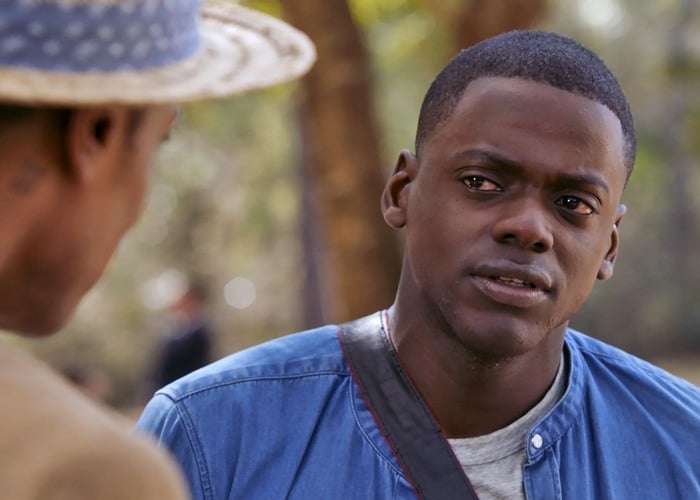
Recently, Deadline announced that Daniel Kaluuya and Lakeith Stanfield are in talks to star in the upcoming film Jesus Was My Homeboy. Should the deal go through, we’ll be rewarded with the reunion of the Get Out stars on the big screen, this time telling the story of Black Panther Fred Hampton.
Outfitted with a fantastic title and currently no release date, the production is already full of noteworthy filmmakers of color. Black Panther director Ryan Coogler and Sorry to Bother You producer Charles D. King are both slotted to oversee the project. Newlyweeds director Shaka King is slotted to direct, write, and produce. And now, Kaluuya and Stanfield will possibly be the film’s leads. The film will detail the rise and subsequent assassination of Hampton (potentially played by Kaluuya), the deputy chairman of the Illinois chapter of the Black Panther Party, through the eyes of William O’Neal (potentially played by Stanfield), who betrayed Hampton to the FBI.
This announcement following the diverse films of 2018 is hopefully a reason to believe that this movement toward diversity is more than a trend — it may be the new normal. Last year was an impressive year for diversity in film, from Coogler’s Black Panther (you know, huge blockbuster, cultural phenomenon, three-time Oscar winner, and Best Picture nominee— that Black Panther) to Barry Jenkins’ more intimate (and absolutely gorgeous) adaptation of James Baldwin’s If Beale Street Could Talk. We’ve still got a long way to go overall, but films like Jesus Was My Homeboy (which currently has only people of color on board) being made and getting publicity is a promising sign of where we’re headed.
And the importance of seeing this diversity in Hollywood can’t be understated: it truly matters. Just think of its impact on kids who are now growing up seeing themselves on screen, like this little girl who met Coogler and confidently introduced herself as “Black Panther’s sister”:
Am I crying at Ryan Coogler getting emotional over meeting a young fan ?? YESSSSS ….. REPRESENTATION MATTERS pic.twitter.com/x92Bpx2Cj3
— Janet 🥀 (@imnosweetdream) February 20, 2019
Equally important to having diverse people on and behind the camera is seeing their stories represented. Jesus Was My Homeboy will be added to a list of films that use their platform to bring something from the Black history books into more conversations. They’re often great films but can be even more important as notable moments in time. I distinctly remember my dad taking me to see Ava DuVernay’s Selma in theatres; many saw Spike Lee’s Malcolm X in theaters years before that. Now, finally, Lee has become the sixth Black director to be nominated for the Academy Award for Best Director for — and an Oscar winner for co-writing — last year’s BlacKkKlansman. Maybe the films aren’t as high-profile as Black Panther (is anything?), but they are significant for their telling of a history that otherwise might not be told.
So as exciting as the possibility of a reunion of the acting talent of Get Out is, hearing about a Black Panther story— this one not rooted in comics— being shared in film is perhaps even more exciting. Hampton’s is a story that deserves to be shared, one that can use the medium of film and high-profile talent to draw wide audiences who can learn about something that history classes often don’t mention.
It’s worth noting that perhaps you didn’t know about Hampton before hearing this news. No judgments from me— I didn’t either and, of course, I didn’t even realize there was a gap in my knowledge. A quick Google search reveals that Hampton’s story is a whole section of Black history I wasn’t let in on. A whole section I might have never been let in on without this film and noteworthy supporters like DuVernay championing it:
Family news. Been waiting for this one. Hyped beyond hyped. ✊🏾🙌🏾👊🏾 https://t.co/jPnPW4Ufi6
— Ava DuVernay (@ava) February 19, 2019
But it’s not worth reflecting on what might not have been. Being able to see my blind spot is exactly why I’m glad this film (and films like it) will exist. It’s not only educating me and the public at large, but it’s making sure that this story isn’t left as untold history. It’s producing more diversity in Hollywood, in its cast and crew as well as the story it is telling. And it’s hopefully, on top of all that, going to be a good film we can get something out of.
Related Topics: charles d. king, Daniel Kaluuya, jesus was my homeboy, Lakeith Stanfield, Ryan Coogler, shaka king

